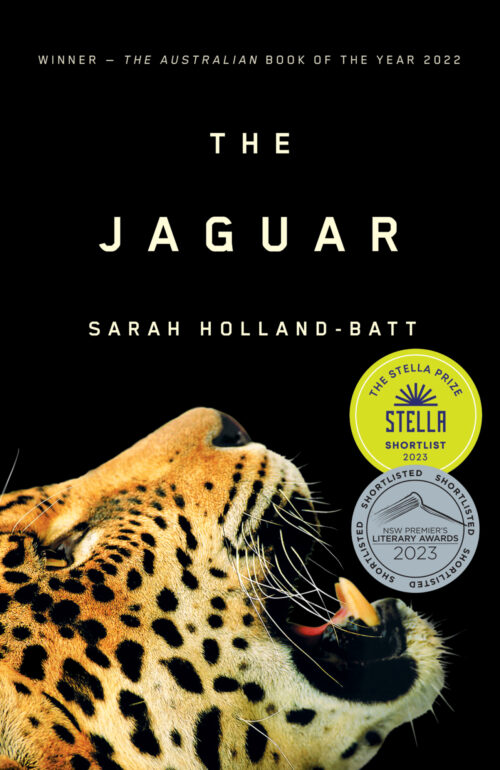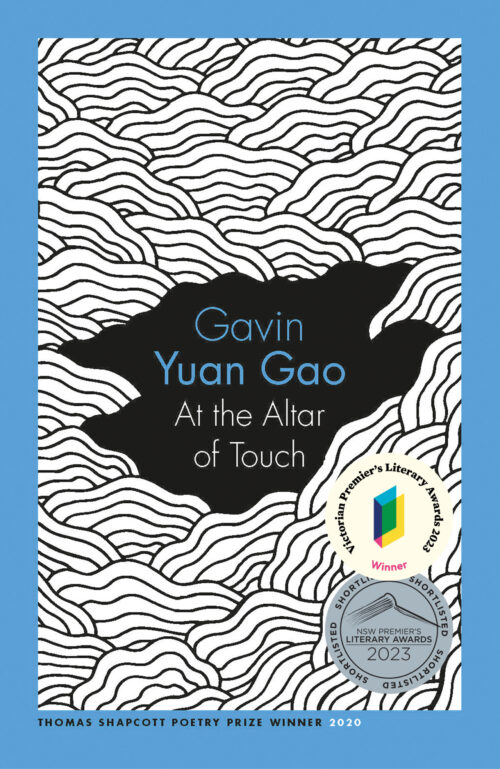
 The Jaguar by Sarah Holland-Batt
The Jaguar by Sarah Holland-Batt
UQP, 2022
At the Altar of Touch by Gavin Yuan Gao
UQP, 2022
Both of these considerable books, The Jaguar by Sarah Holland-Batt and At the Altar of Touch by Gavin Yuan Gao, arrived into my hands, out of their padded envelope, with all of the gravitas of prize-winners. They are, both of them, winning books – they shine with sincerity and reach and craft – and they won me over with minimal resistance on my part.
(Now is surely not the time to discuss the impiety of writing poetry with the intent to glean a prize but it might be a useful conversation we ought to have some time further down the line.)
At the time of receiving, I knew At the Altar of Touch had won the Thomas Shapcott Poetry Prize and had gone on to win the Victorian Premier’s Literary Award for Poetry. Really fancy footwork for a debut book. But that is the beauty of the Thomas Shapcott. It offers an enticing lump sum to an emerging poet and (!) publication with a reputable press. And few of the winners over the twenty years it has been running have not gone on to enliven and ornament the community of Australian poets. It was only while I was researching that I realised you have to be a Queensland poet to enter. (Oh dear oh dear oh dear. Can the other states and territories please step up!)
And it was only while I was researching that I remembered Sarah Holland-Batt had won the Thomas Shapcott in 2007 for Aria – a book so sharp and knowing that it was practically lethal. I liked it. I liked it a lot.
And, at the time of receiving I knew The Jaguar had been awarded the 2022 Book of the Year Award from The Australian. But I was not expecting that to be the last of it, not by a long chalk. And at the time of writing The Jaguar has been shortlisted for the NSW Premier’s Literary Awards and longlisted for the Stella Prize. By the time of publication, I am confidently expecting many more such acknowledgements of this book’s towering ambition and achievement. It could well be that this book will emulate or even outclass the note-worthy scooping up of three major Australian prizes by Robert Adamson’s The Clean Dark in the 1990s. It may even go international (I am thinking the Griffin Poetry Prize in Canada) as foreshadowed by Pulitzer Prize winner Forrest Gander in his endorsement on the back cover.*
And now to our muttons, as the French might say when they want to get down to brass tacks. Just what is it about The Jaguar that lifts it above the common ruck, that delivers such a glittering festival of artful poetics, that makes it so unputdownable?
I venture to suggest that one of the hooks the poet trawls our way is the drama of surprise. The title idly put me in mind of Rainer Maria Rilke’s famous poem ‘The Panther’. And the epigraph by Friedrich Schiller from ‘Ode to Joy’ – ’Above stars must He dwell’ – did not turn me aside from this notion of the bent of the book. Learned, quasi-reverential, muffled by the cloak of the past. I was not anticipating a blood jet of poetry. (Vale, Sylvia Plath.)
So, one arrives at the title poem in the second section on page 42, and the shock of revelation, the heady plunge into the deceptively deep pool. I almost giggled, I was so taken aback by the poet’s chutzpah and stealth.
SPOILER ALERT!
The jaguar is a car! A bottle green, or forest, vintage 1980 XJ, a chrome wildcat ornament lunging on the hood. Oh, the drama shading into melodrama and settling plump into excoriating psychodrama.
From ‘The Jaguar’,
………………………………. For months he drove it even though my mother begged, he drove it as though he was punishing her, dangerously fast on the back roads, then opened up the engine on the highway, full throttle, even though he was going blind in one eye, even though my mother and I refused to get in, and for the first time in years my father was happy – he was happy to be driving, he was happy my mother and I were miserable. (42)
This coup de theatre is even more unnerving and delightful (if one likes that sort of thing) because the twenty poems that precede it lull the reader (or at least this reader) with sheer technical esprit – a more finely-wrought elegiac and affecting meditation than usual, a more vivid and compelling chronicling of the Last Rites than one normally comes upon. But the trope – a parent is dying, quickly, slowly, etc., etc., and everything in between – well, it’s not exactly breaking new ground. Many of us have parents known to us, and these mothers and fathers will die early, late, quickly, slowly. (Unless they outlive us. And that’s another story.) It’s the very stuff of poetry. And if it is well done one feels it feelingly. But Holland-Batt works this familiar theme with consummate panache. I am very aware of the sacred personal nature of these confidences, of the suffering glinting up off the pages. This is a subject that is wholly tragic. It may be why I am joking around with the macabre humour that can erupt around death. It is like the way one laughs and chats after the funeral, bolting down strong cups of tea and ham sandwiches, just to get the taste of life back in your mouth.
From ‘My Father as a Giant Koi’,
My father is at the bottom of a pond perfecting the art of the circle. He is guiding the mottled zeppelin of his body in a single unceasing turn like a monorail running on greased steel, like an ice skater swerving on a blade. (3)
There is a shocked sense of the ridiculous underlying this poem. The grotesque description of death as ‘circling the drain’ comes to mind. The man himself – Dr Anthony Bertram Holland-Batt – flickers into sight.
From ‘Time Remaining’,
In this void of time in which my father remains – I want to say, is remaining – present continuous – he returns to me. Hello sweetheart, he says blurrily, I'm just trying to get the damn thing working. And as if I can see what he's seeing I ask, Is it plugged in? He says, I'm beginning to wonder (12)
But then, in the midst of this exercise of remembering and recording, the cunning, pattern-making, unforgivable imagination of the poet begins to get up a head of steam.
From ‘Brazil’,
…………………………………… I see the silverware gleaming in front of him. I see him lifting a cup filled with jaguar's blood up to the light, how it gleams like wine. I see the raw jaguar's heart filleted in the finest slivers, carmine red, laid out like a stinking meat flower in front of him. (7)
This is the first sighting of the jaguar. This telegraphs the title poem which announces the central motif. But we are not done yet. The book almost becomes, in the most beguiling way, a Where’s Wally? of jaguar sightings. The next glimpse is in the third section, where the poet abandons her death watch and craves cabochons and bonbons, a sweet low cello, and a glass of beaujolais, and becomes positively waspish about millionaires, Eurotrash, and the genre of men in general, and also in particular, as if she is channelling Dorothy Parker. ‘What fresh hell is this?’ Holland-Batt contains multitudes and can frock up and down cocktails, and skewer and sulk, and parody conspicuous consumption, and turn chaps down flat who jet in to offer her holy matrimony. She praises her stony and unbending nature, her hardness. As do I.
From ‘Ode to Cartier,
…………….. let me die in peace with the silk of a jaguar's breath huffing in my ear at dawn. (68)
This is a carnivorous world and risky business. And so much of it seems to hinge on gifts from the father. How the dangerous father looms.
From ‘Meditation on Risk in New Hampshire’,
…….. I think of the conversation I had last night with a Mexican filmmaker who grew up with a pet jaguar in Sinaloa – a gift from her father, a man she called a character – and how she loved that cat, how she used to sit with it, even after it tore apart her brother's beagle and ate it. (93)
The blurb on the back of the book states that this is a collection written by a poet at the height of her powers. But the work presented to us within the covers of this very handsome book, with all of its simmering, lowering threat of heavy weather, and its unguarded display of sheer transfixed commitment to technique, suggests that we ain’t seen nothing yet.









